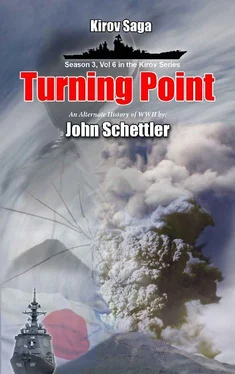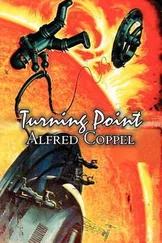Guderian simply nodded, and then Hitler turned his back on him. “That will be all, Herr General,” he said with no emotion.
* * *
Thedecision made that day at OKW would end up being all for the good, and even Guderian had mixed feelings about it. On the one hand, seeing the reins of command taken from him stung, and the thought that Hitler would be trying to command his divisions from his post at OKW made him shudder. A sense of fatalistic shame fell over him, and the fatigue of these long months in the field now became utter exhaustion. After the long bitter struggle there was no sense of victory, no toast to the fallen heroes. All he had in his mouth was the taste of defeat. On the other hand, events were soon to see his Army pass to the hands of a most capable man.
On the other side of that massive pocket the Soviets had also put considerable pressure on the lines of communications from Moscow to Minsk. One main attack was pushed through to recapture Vyazma, eventually reaching the heavy wooded zone beyond. Further west, Wiktorin’s 22nd, Schubert’s 23rd, and Heinrici’s 43rd Infantry Korps were the object of a big Soviet pincer attack, the one von Schweppenburg had heard about in his hectic conference with Guderian. The left pincer stormed through Vitsyebsk, with the right pincer aimed at Smolensk on the other vital communications line leading to Moscow. The Germans did everything possible to get fresh infantry forward on the limited rail system. Orsha, west of Smolensk, became a vital communications hub that was nearly overrun by a fast moving brigade of Soviet tanks.
There, the newly arrived 85th and 100th Gebirgs Regiments pulled from Army Group North reserve had leapt from the trains and just barely managed to hold on to the city. It commanded the major rail line leading east to Smolensk, and if that city were to fall, and the Russians reached the lines of their encircled comrades that had been stubbornly defending Kirov, then that pocket would suddenly form the southern and western wall of a new pocket that would be four times its size—only this time the tables would be turned and it would be filled with German troops, every unit the Wehrmacht had thrown at Moscow. It would leave over 50 divisions encircled, and with no secure line of communications back to points south and west, and Germany.
One particularly vital train just squeaked through Orsha carrying units of the 11th Army that were taken from the forces assigned for the Crimea. These vital fresh infantry divisions would attempt to stop the encirclement of Smolensk, at least on the westernmost side of that double pincer attack.
This halted the retrograde movement made by those three infantry Corps between Orsha and the lines east of Smolensk, and now they would be under threat of encirclement should the Russians achieve their strategic aims in that sector. In other places, Hitler picked up wood blocks representing the panzer divisions that had been withdrawn to rear areas for refitting, and began to assemble them in a group he intended to use to smash the Soviet attack. The only problem was the fact that these unit markers could be moved on the map far easier than the units themselves could be moved on the field, and attack orders would soon reach bewildered Panzer Commanders where no concentration of battle ready troops even existed.
Halder was having his own fits, and threw up his hands in utter frustration with Hitler’s ceaseless fuming diatribe. It also galled him that, in the south, no major enemy offensives had been aimed at Manstein’s forces, which created the impression in Hitler’s mind that his new favorite General was now the only commander he could rely on, the only one not in distress and still contemplating offensive operations.
Yet soon the full breadth and scope of the Soviet attack would finally be seen, and Manstein’s offensive, poised to resume operations towards Volgograd as soon as weather and ground permitted, would find itself caught up in the winter war blowing in from the icy north.
* * *
Far to the south, where temperatures were less severe, Manstein’s drive between the Don and Donets had also ground to a halt in January. If viewed on a map, the line of his advance resembled a massive wolf’s head, with the eyes and forehead of the beast being the position of his tough SS Divisions. Realizing conditions were not favorable for continuing his attack, he had waited to bring up 14th and 16th Panzer Divisions, and the 25th Motorized Division into the snout of the wolf, where they were planning to strike south towards the vital crossing of Voroshilovgrad on the Donets. If taken, it would cut off 18 to 20 divisions north of that river above the Donets Basin. Without either destroying or forcing the withdrawal of these units, Manstein could not continue his planned offensive east towards Volgograd, which now had to be postponed until the Spring.
To smash this force and compel its withdrawal, he had been husbanding all the new heavy tank brigades being sent from Germany and holding them in the city of Kharkov. There were 501, 502 and 503 Schwerepanzer Brigades, and three more smaller Panzerjager battalions that had been receiving new equipment, with 88s mounted on a mobile chassis, called the “Nashorn.” He decided to move them east on the short open rail line to Kupyansk, and use this mass of armor as a hammer to break through there and aim another drive at Lischansk on a looping bend in the river.
Yet just as this force assembled to begin its operations, the news of the massive enemy offensive to the north came in, and Manstein himself was summoned to Berlin. After a long cold flight home, he met with Hitler in OKW headquarters and learned the real reason he had been recalled from the front.
“The incompetence of my Generals astounds me,” Hitler began. “After months of hard fighting, they have given the enemy vital ground back and put our forces in real jeopardy—particularly Guderian. He was the worst of the lot. His withdrawal order led to the collapse of the entire flank along the road from Orel through Tula to Serpukhov. I have had to relieve him of command and will now take control of the situation personally.” He pointed to the map, which Manstein now saw with updated positions neatly drawn in by Halder’s staff.
“As you can see, Guderian allowed them to push right through Orel and all the way to Bryansk to reach the Kirov Pocket. They have also reached this pocket from the north at two places, though I have ordered our infantry to hedgehog in place. To make matters worse, a second wave of this enemy offensive has begun north and south of Kursk. I cannot imagine where they have found all these troops to fling at our positions.”
“My Führer, I can tell you that in one word—Volkov.”
“Volkov? What did he have to do with this?”
“His offensive across the Volga north of the city has been stalled for some time, because the Soviets poured massive reinforcements into that sector. In one sense this was helpful for us, as those were troops that might have otherwise gone to the battle for Moscow. Yet now, Volkov’s position west of the Volga has collapsed. He gave the order to withdraw east of the river two weeks ago, and this has changed everything. I sent reports to this effect at that time. Were they heeded?”
“Halder has turned this entire headquarters into a shambles!” Hitler fumed. “I was not aware of this development until it was too late.”
“Well that is the reason the enemy has fresh, well tested troops to make this attack in the Kursk sector. Once Volkov withdrew, the defense on the Volga could be managed by a single army posting good divisions on the few available crossing points along the river. This left the bulk of the troops, possibly three or four field armies, free to be moves west to Kursk. Halder informed me there was a new enemy offensive underway there, but I was not aware of its extent.”
Читать дальше












